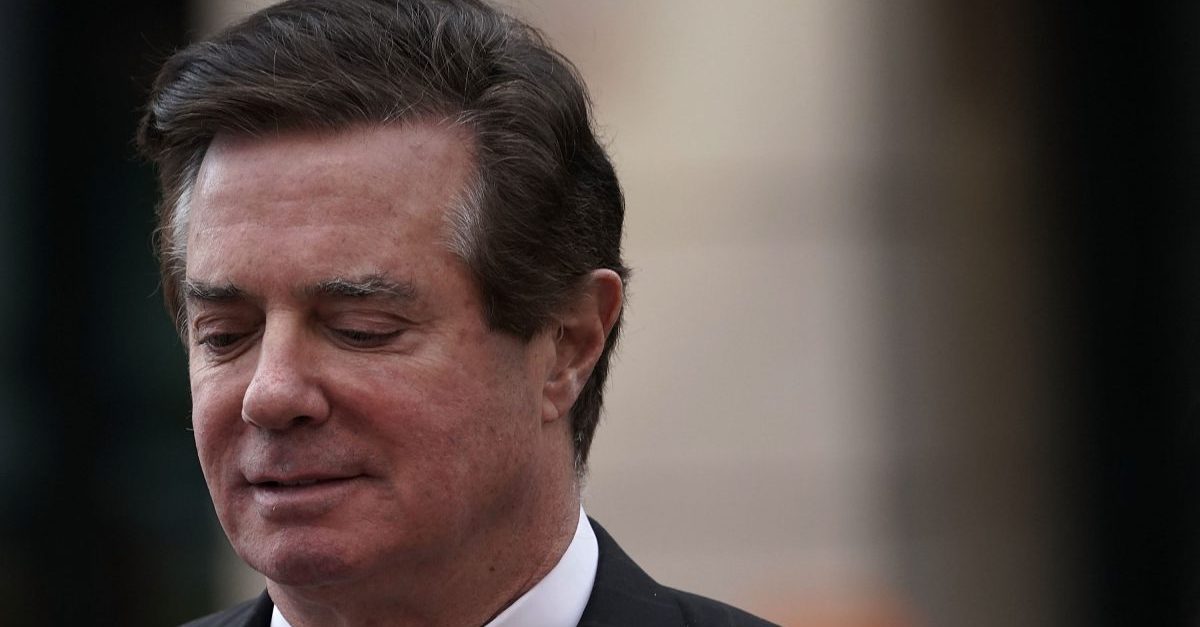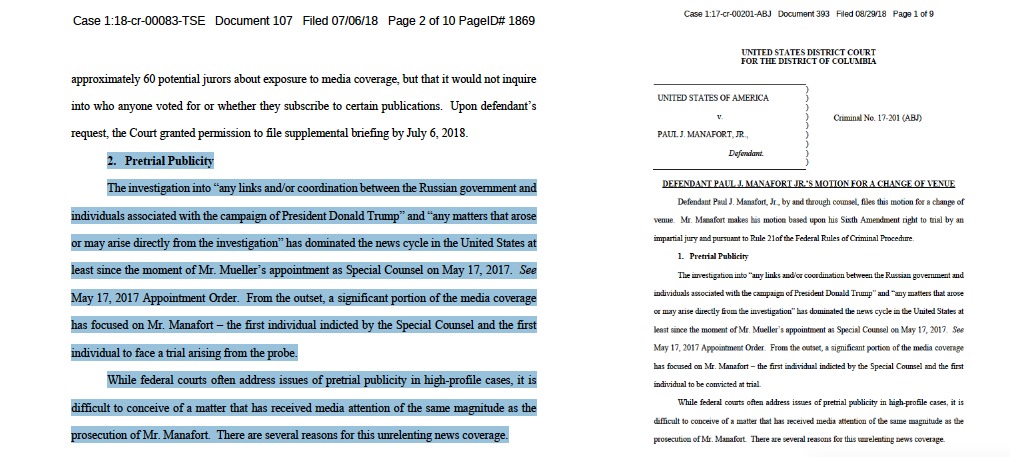
Convicted felon Paul Manafort just filed a request to have his upcoming Washington, D.C. trial moved to heavily-Republican Roanoke, Virginia.
This change of venue motion tracks with an already-tried and already-failed attempt to have Manafort’s recently-concluded Alexandria, Virginia trial moved to the GOP stronghold. Previously, Manafort–by way of his attorneys–argued that Alexandria was just too close to D.C. and too full of Democrats keenly interested in Special Counsel Robert Mueller‘s investigation.
The suggestion to move proceedings in that case out of the D.C. metro area was quickly shot down by U.S. District Judge T.S. Ellis III. So, now, Manafort’s defense team is trying the same thing with U.S. District Judge Amy Berman Jackson.
In the motion submitted with the U.S. District Court for the District of Columbia on Wednesday morning, Manafort’s defense attorneys Kevin Downing, Richard Westling,and Thomas Zehnle argued essentially the same points as before–oftentimes just cutting and pasting the first motion’s exact same verbiage in service of the already-failed argument.
For example, consider the following language contained under the “Pretrial Publicity” header in the first Roanoke request:
The investigation into “any links and/or coordination between the Russian government and individuals associated with the campaign of President Donald Trump” and “any matters that arose or may arise directly from the investigation” has dominated the news cycle in the United States at least since the moment of Mr. Mueller’s appointment as Special Counsel on May 17, 2017. See May 17, 2017 Appointment Order. From the outset, a significant portion of the media coverage has focused on Mr. Manafort – the first individual indicted by the Special Counsel and the first individual to face a trial arising from the probe.
While federal courts often address issues of pretrial publicity in high-profile cases, it is difficult to conceive of a matter that has received media attention of the same magnitude as the prosecution of Mr. Manafort. There are several reasons for this unrelenting news coverage.
Contrast the above language with that used in Manafort’s Wednesday defense motion for change of venue:
The investigation into “any links and/or coordination between the Russian government and individuals associated with the campaign of President Donald Trump” and “any matters that arose or may arise directly from the investigation” has dominated the news cycle in the United States at least since the moment of Mr. Mueller’s appointment as Special Counsel on May 17, 2017. See May 17, 2017 Appointment Order. From the outset, a significant portion of the media coverage has focused on Mr. Manafort – the first individual indicted by the Special Counsel and the first individual to be convicted at trial.
While federal courts often address issues of pretrial publicity in high-profile cases, it is difficult to conceive of a matter that has received media attention of the same magnitude as the prosecution of Mr. Manafort. There are several reasons for this unrelenting news coverage.
And here’s a side-by-side comparison:

As national security journalist Marcy Wheeler noted, “They are SO dialing things in at this point.”
Aside from rehashing the already-failed argument using nearly the same language–slightly updated to reflect recent events–Manafort’s defense team makes the claim that press coverage of their client’s first trial focused on the 2016 presidential campaign.
The Wednesday motion states, “[T]he reporting on this prosecution has often been sensationalized and untethered from the facts in the case … while the Virginia trial barely touched on issues relating to the presidential campaign, the news media barely goes a day without drawing a connection between the two.” Manafort’s defense team failed to provide a single citation to support their claim here.
Where Manafort’s attorneys do offer citations in service of the “untethered from the facts” argument, one such citation simply refers to a video of Manafort arriving at a Virginia jail while the other blames President Donald Trump for incorrectly referring to the outcome of Manafort’s criminal proceedings. The motion notes:
[O]n June 15, 2018, this Court revoked Mr. Manafort’s release and remanded him into custody. This event unleashed a spate of intensely negative news coverage suggesting that Mr. Manafort violated the law. Indeed, even the President’s response on Twitter; observed that Mr. Manafort received a “tough sentence,” incorrectly suggesting that Mr. Manafort had been sentenced for committing a crime.
As far as whether these arguments–whether novel or rehashed–may be persuasive, Judge Jackson has already indicated she believes high-profile cases can be tried by the D.C. District Court–as they have numerous times in the past. In comments at a Tuesday hearing, Jackson said, “This jurisdiction has had very high profile cases before. I’d like to believe that is still possible.”
[image via Alex Wong/Getty Images]